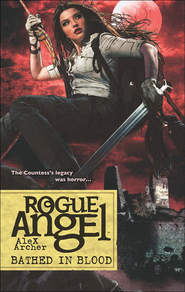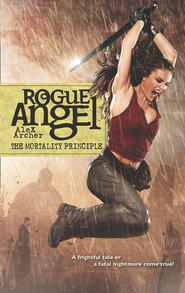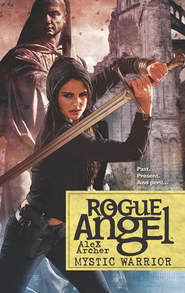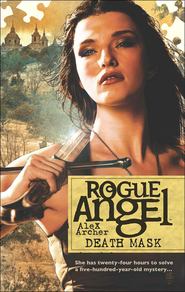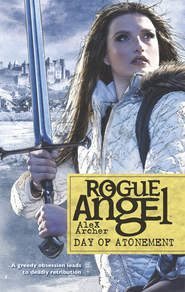По всем вопросам обращайтесь на: info@litportal.ru
(©) 2003-2025.
✖
Swordsman's Legacy
Автор
Год написания книги
2019
Настройки чтения
Размер шрифта
Высота строк
Поля
Both men jumped down into the pit, about three feet deep and seven or eight feet wide. Ascher started tossing them tools, trowels and the small shovel. Grinning at Annja, he then jumped into the pit and began to direct them.
So he hadn’t lied about promising to make them wait. But Annja sensed he still lied about something.
“Light, please, Miss Creed,” Peyton said.
Annja flashed the light over the pit. She saw that indeed something was embedded in the dirt. It looked like a corner of a box. An old wooden box that had once held—and maybe still did hold—a valued sword?
“It’s a sword box,” Ascher explained as he carefully brushed away dirt. “Jay opened the end. That is when I contacted you. And you did ask me to wait.”
Trowels clicked against wood and the men worked furiously to uncover the entire box.
Annja didn’t even mind the chill that had settled with nightfall. Brushing her fingers over her bare shoulder, she felt an abrasion. The thug’s bullet had barely damaged the skin. No blood. Though her flesh did feel warm. Excitement fueled her temperature up a few notches, she felt sure.
“There is a sword inside!” Jay announced grandly. He had a hand poked in the exposed end of the box where the coat of arms had been removed. “I can feel the curve of the pommel through the cloth. It must be wrapped in a sword bag. And it will be d’Artagnan’s sword!”
Annja smirked. “I’ll believe it when I see it.”
A N HOUR LATER , Annja believed.
The box was open, she squatted next to it, holding the sword that Ascher had carefully laid upon her palms. Jay held the camp light above their heads as they all preened over the weapon.
It was a rapier, apparent by its short and narrow blade. The hilt was ornamental. Not a fighting sword, but one worn by a gentleman as an enhancement to his wardrobe, a decorative accessory.
Surprising. Yet Annja assumed if the queen had commissioned it, she may not have thought to gift her favorite with a fighting weapon.
The light Jay held flickered. “We’re losing juice,” he said.
“We’ll take it to my home for a better look.” Ascher reached for the sword, but paused. “You hold it, Annja. Let’s pull out the box and then leave.”
C LUTCHING THE SWORD BAG to her left shoulder, the base of it stretched onto the small floor space in the rental, Annja nodded off as Ascher drove. She didn’t feel the need to chat, so long as she held the sword.
She’d left the pilfered Glock with the Nash brothers, with an encouragement to decamp and leave quickly. There was no telling how quickly the thugs would discover the sword dupe and return for the real thing.
Two hours later they arrived at Ascher’s home just south of Sens. The town was once the capital of the Gallo-Roman province. Abelard’s doctrines were condemned here, and Annja recalled, Thomas Becket once lived in Sens during exile from England. Perhaps she’d find a few hours later to explore the city, after the sword had been examined.
The sun had yet to rise. Annja guessed it was 3:00 a.m. but she couldn’t get a view of the digital clock on the driver’s side of the dashboard.
Ascher lived in an estate that resembled a castle with tiled pepper-pot turrets to each of the four corners. It was probably officially considered a château, she thought. It even had a dry moat. The brickwork was streaked with black, and more than a few tiles were missing from the roof and turrets. It needed a bit of tender loving care, Annja figured. As the car’s headlights flashed over the exterior, she saw climbing vines painted the limestone block and seamlessly blended the house’s corners into the large rectangular yew shrubs that hugged it.
A house in the country replete with a sexy Frenchman?
Hell, she really did need to sleep. After the encounter with the thugs, she felt quite certain she could spit farther than her trust extended toward Ascher Vallois.
He offered to carry the sword inside. Determined not to let it out of her sight, Annja walked past him. For some reason she felt an attachment to the thing, though it hadn’t even been her dig.
Because you’ve wondered and obsessed over it for years—that is why, she told herself.
And what would she do if it was authentic? It wasn’t her find. Nor Ascher’s. According to French find laws, all artifacts belonged either to the living relatives—if the artifact could be verified as to owner—or then to the city of provenance, and finally to France itself.
Standing in the dark foyer, Annja clung to the weapon as she looked about. A low ceiling lamp switched on, illuminating the immediate area, but fading out into a dark hallway. Dark stained oak coated the foyer from floor to ceiling and gave off a musty odor Annja associated with the stacks of old libraries.
There were a few swords displayed point down from ornate hangers on the wall opposite the door. Nothing Annja immediately recognized to century or country of origin.
What caught her eye were the acoustic guitars of every design hung high on the walls. Art deco glass lamps focused spotlights on an ivory-inlaid fret board or the shiny gold tuning pegs on a small instrument that resembled a ukulele more than guitar.
“Do you play?” she asked.
“No, but I appreciate.” Ascher strummed his thumb across the strings of one specimen. “Mid-nineteenth century. A real Spanish guitar once played by Paco de Lucena, famed flamenco artist from Granada, and not to be confused with the contemporary Paco de Lucia. You like music, Annja?”
“Of course. I never travel without my iPod.” She dangled her backpack from three fingers. “Usually use it as background when I’m researching. I’ve some Sabicas on my playlists.”
“Ah, an aficionado. Sabicas is real flamenco puro. ”
“I’m not even close to being an expert. I just like guitar music,” she said.
Her eyes trailed lazily away from the guitars and across the tiled floor, which resembled the rusted color of dried clay from Spain. In her backpack were her laptop, iPod, digital camera, her ever present notebook and a clean pair of shorts and T-shirt, not to mention bra and underwear. A change of clothing felt necessary, but trying. She found it impossible to stop a yawn.
“You can stay the night,” Ascher offered as he led her left into a small room. “Or what remains of it.”
A fieldstone hearth and shelves of books lined the walls of the small yet cozy den. Brown leather furniture sat as if it had been built with the house, so regal, yet aged and in need of repair. A ragged-edged map hung over the hearth. France, post-Revolution, for the names of the monuments were all changed, such as the Temple of Reason instead of Notre-Dame.
All the room needed was a lazy mastiff lounging on the bearskin rug before a crackling fire to complete the look.
“I’m tired,” she said. “But I don’t feel like sleep.”
“You stole a nap in the car.”
So he’d noticed.
“Much needed, I’m sure, after your certain brilliant actions against those men with guns,” Ascher said.
“Certain brilliant actions?”
He shrugged. “Treville told d’Artagnan such actions were a requirement—”
“To become a musketeer.”
And despite her exhaustion, Annja smiled. Now she remembered what had attracted her to Ascher in the first place, and why she had enjoyed his cyber company so much. They shared common interests, such as sporting and adventure, and archaeology. And a love for Dumas’s famous story.
Resisting full collapse, Annja sat on the edge of a comfy leather ottoman. Carefully laying the sword across her lap, she then burrowed into her backpack for the cool rectangle of her digital camera. “Let’s take a closer look at the sword, okay?”
Pushing aside some books and magazines, Ascher cleared a marble table against the wall opposite the hearth. “I will lay out some clean paper and find us some gloves.”
He produced a large sheet of butcher’s paper from a drawer under the table, which he laid over the white marble. A box of disposable latex gloves was produced from a cabinet on the connecting wall. Annja realized that an archaeologist, even if only part-time, would have all the essentials.
“So why only part-time?” she asked, still clinging to the ancient, dirty velvet bag as Ascher smoothed out the crisp paper.
“What? You mean the digging? It is no more than a hobby.”






